|
(from the one-and-only Walter White): AKA Bryan Cranston Here's the video, with a transcript below: tl;dr you're not going there to get a job, you're going there to do your job “Well, the best advice for fellow actors is this: Know what your job is. About 18 years ago I had this cognition that I realized I was going into auditions trying to get a job. And that simply wasn’t what I’m supposed to be doing. An actor is supposed to create a compelling, interesting character that serves the text. You present it in the environment where your audition happens, and then you walk away. And that’s it - everything else is out of your control. So don’t even think of it, don’t focus on that. You’re not going there to get a job. You’re going there to present what you do: you act. And there it is and walk away. And there’s power in that, and there’s confidence in that. And it’s also saying, ‘I can only do so much.’ The decision of who might get a job is so out of your control that really, when you analyze it, it makes no sense to hold on to that. That, to me, was a breakthrough, and once I adapted that philosophy I never looked back, and I’ve never been busier in my life than once I grabbed onto that. That’s it. Good luck.” Ask yourself this question: Do you enjoy performing? If you're reading this post I'm assuming the answer is yes. :) But what about auditions? Do you enjoy auditions? It's possible that some of you out there do, but most people cringe at the thought of having to audition compared to performing. So what's the difference? Since I started audition coaching I've been frequently surprised by clients who have shown up not yet knowing the material. Your audition is in a week! Imagine if we hadn't done this and you'd gone to your audition still not knowing the material?! Then we just have to resign ourselves to the fact that it's not the most productive use of the time but it's still better than nothing. Even in that situation, one of the most valuable things about the coaching process is practicing working with your audition nerves. Nerves are a normal and important part of performing, yet we somehow learn to work with/use our performance nerves to the benefit of our performance and some people even view them as positive and helpful. So why do audition nerves get the better of us compared to performance nerves? The answer is preparation Think about it - by the time you reach the theatre you've most likely been rehearsing for up to three months and (hopefully) know your stuff inside-out and back to front. You've learned your lines, you know the chore, you've been practicing on the set - you're all good to go. If you take out the costumes, hair, blocking, etc., the amount of preparation you put into just singing your song in a performance is actually only a very small part of that up-to-three-month process. In the 'stand-and-deliver' context of an audition, where you only have to focus on the singing, that amount of preparation doesn't actually feel like much in comparison. Yet people keep cramming and panicking because they're not as prepared for their audition as they would be for a normal performance because they're not actually treating it as a performance. This is Scar. Scar is prepared. Be like Scar. "Be Prepared". :) And you enjoy performing in front of an audience - you said so yourself. Audiences and audition panels aren't really that different when you get down to it. In reality they both judge your performance, the only real difference is that there's something riding on the panel's thoughts and you hear the outcome of their opinions (not saying that the audience doesn't have opinions, you just don't necessarily hear them). So treating the panel as an audience allows you to connect with them and communicate - to perform - just the way you would with any other audience. Remember what I said about audition panels being lazy - they don't want to see a 'fixer-upper' they can work with for a few months. They want a performer: Give them a performance Performing in the audition room should be no harder than performing in front of an audience, as long as you're prepared. If you spend the same amount of time preparing for your audition (remember, the singing part alone really isn't that much) as you do for a performance it then becomes a performance which a) makes it easy(er), and b) makes it fun.
If you do as much singing preparation for your audition as you do for a performance you'll go in there as confident as you normally do when you're performing and can treat it as just that - a performance - which is exactly what the panel wants to see. :) I have two standard tips for picking the perfect audition song/s first time, every time. I'll lay them out first, and then I'll explain why. My Two Standard Tips for Picking the Perfect Audition Song/s First Time, Every Time* (*because is there any another option?) Tip 1: Songs in the style of the show are often in the style of the composer, so why not start with some of their other works? Nothing shows you can sing <insert composer name here> like singing <insert composer name here>! Tip 2: Think about the character you're auditioning for - what are their wants? Their troubles? Their dreams? Once you've worked that out, try and find a song from another show that relates to your character's situation somehow. E.g., if you were auditioning for Eponine in Les Mis you could try "I'm Not That Girl" from Wicked - see the connection? That shows me, as a member of the audition panel, that you've put some time and effort into your song selection, and thought about the character (remember what JRB said?), rather than someone who always sings the same two songs, no matter what show they're auditioning for. Now, before I get to the 'why', I have a question: what happens in the callback that you don't get to do in the audition? Any ideas? You get to sing one of the actual songs sung by the character you're auditioning for That's exactly what you DON'T get to do in the initial audition, but remember - audition panels are lazy. They don't want a project they can work on for a few months, they want a performer they can slip into a costume and slap on the stage. So, why my two tips? They give you the opportunity to let the audition panel see you perform in the context of the character that you wouldn't normally be able to do until the callback That's it. Rather than singing two completely random songs, that, sure, may be great for your personality/voice, help the panel 'see' you in the role as quickly as possible by tailoring your songs to fit that role. It sounds ridiculous to actually have to say it, but we see people making this mistake all the time. My favourite story involves an auditionee singing a reggae version of "Under the Sea", accompanying themselves on the guitar, in an audition for Into the Woods. It probably comes as no surprise that they didn't get in. But what if I'm not auditioning for a role, I hear you ask? Well I say, why not? Doesn't hurt to aim high. Better to aim for the lead and get it or end up with a supporting role than not try at all. I recently had a student cast in a (hard and lead) role he didn't even audition for and he worked his butt off for three months and totally nailed it. You'll never know unless you try, and all that. Yeah but the person who wrote this show hasn't written any others, so your first tip is flawed OK I must admit this is sometimes the case. So then it's time to get creative. If you can't use something from one of the composer's other works, aim for Tip 2 - find a song that suits the character's situation, then contrast it with one that shows off your voice. Or if you don't like anything from the composer's other shows, some writers, such as Jason Robert Brown and Duncan Sheik, have written solo albums that, although technically not musical theatre, still reflect their own particular style. If you look even further, Bobby Lopez (Frozen, Avenue Q) wrote the music for the Scrubs musical episode and ps classics released an amazing posthumous album of Jonathan Larson's original demos and other material^ (Wikipedia can be your friend with this stuff). There's always something out there if you look hard enough. And one final bonus tip is to look at other material the performer of the original song has sung. Much like finding your 'box', most of Idina/Sutton's songs have a similar sound/style so that may be another good starting point when thinking about songs that suit your character. :) What about developing an audition/repertoire book? I guess it doesn't hurt, but I can pretty much guarantee, no matter how many songs you end up including, it will never have the exact perfect pair you need for that particular show. Sure, it's possible, but I highly doubt it. Better to prepare individually for each and every role, tailoring your songs to the exact character using the tips above. But if you do want to take the audition book path make sure you have something from every era/style: pre-1950s ballad, pre-1950s upbeat, post-1950s ballad and upbeat, comedy number, belt extravaganza, etc. Better to cover all bases and make sure these are songs that you regularly revisit/keep fresh in your mind as it's no use having the book if you can't all on it with as little as 24 hours' notice.
^ Wearing Someone Else's Clothes and Jonathan Sings Larson both feature early songs cut from final versions of the shows - worth a listen purely for interest's sake. I have a few friends auditioning for The Book of Mormon in Melbourne at the moment, and was chatting to one of them after this afternoon's call. The casting brief clearly states "There are no roles in this production for Caucasian females" and today's auditionees were clearly told that, if they didn't suit the 'look' of the show (male or female), they wouldn't be in the room for long. As much as many performers think they can 'wow' the panel with their abilities, even if they don't fit the character/s they're looking for, the reality is it's pretty unlikely. The conversation reminded me of a masterclass I attended a few years ago from multi-Tony-Award-winning composer/lyricist Jason Robert Brown where he laid down the following realities of auditioning for him / a Broadway show: Look at him. This guy knows what he's talking about. Realities of Auditioning for Jason Robert Brown / a Broadway Show Reality 1: From the moment your foot passes that doorframe if you don’t LOOK like the character they want they won’t even listen to the first note you sing. Reality 2: If you DO look like the character they want they'll listen to the first note you sing. Then, if you don’t SOUND like the character they want they won’t listen to another thing. Reality 3: If you LOOK and SOUND like the character they want you will have their full attention for the remainder of the audition. You may think that sounds harsh but it's simply the reality of our industry, and I for one am thankful that JRB chose to be honest and direct about it without perpetuating the fantasies many performers have. He went on (I'm paraphrasing)… Audition Song Choice "Why would you sing a song by a character whose background, race, colour, or some other feature outside of your control differs from your own? As beautiful as it may be, no white man is ever going to sing “Let them Hear You” in a production of Ragtime – even practicing it is a waste of your time. Likewise, no white woman is ever going to be cast as Kim in Miss Saigon, so singing “I’d Give My Life For You” isn’t going to help you either." That's actually Sylvie Paladino. Amazing what they can do with makeup these days. Photo: Joan Marcus 'Boxes' JRB also spoke about 'boxes'. All performers fit into a 'box' and working outside of that box is not going to get you cast. Why sing “I Cain’t Say No” when you’re a belter, have only ever been cast as a belter, and only ever will be cast as a belter? Similarly, if you’re a character actress, why sing “Don’t Cry for Me Argentina” when you’re only ever going to be cast as Mae in Lippa’s The Wild Party or Columbia in Rocky Horror? Find your box and work to your strengths. Look at the greats – Patti LuPone is Patti LuPone in everything she does; Bernadette Peters is the same and, closer to home, so is Anthony Warlow. They found their box and they worked it. You’ll never see Warlow playing Mark Cohen in RENT and the idea itself is laughable. It would truly be a square peg in a round hole. Not sure how to find your box? Look at other performers whose roles you know you're capable of/suited for. Most of Idina/Sutton's songs have a similar sound/style so that may be another good starting point when thinking about songs/roles that may suit you. Anthony just heard about Jersey Shore: The Musical. Photo: Quentin Jones Audition Preparation Finally, JRB said the same thing you always hear when the pros talk about auditioning but, for some reason, it regularly seems to be ignored: KNOW THE CHARACTER YOU ARE AUDITIONING FOR. It sounds simple but if more people truly understood the role and their own abilities I can guarantee that fewer and fewer characters would fit into their box. And that’s not such a bad thing. Consider these two outcomes:
1. You do one audition for a role that fits within your box and you were close to perfect for but missed out to the only other auditionee truly suited to the role, or 2. You do thirty auditions for no roles that actually suit you and beat yourself up after every single one because you hadn't thought about your suitability for the role and couldn’t actually appreciate that you weren’t cast because it’s a role you never should have considered auditioning for in the first place. I know which one I’d prefer. :) |
Categories
All
Archives |


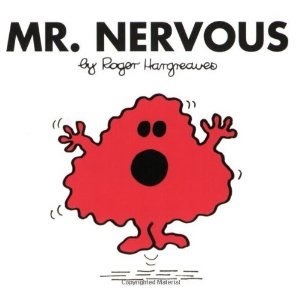

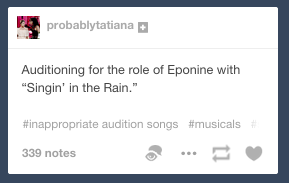
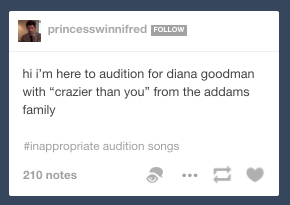
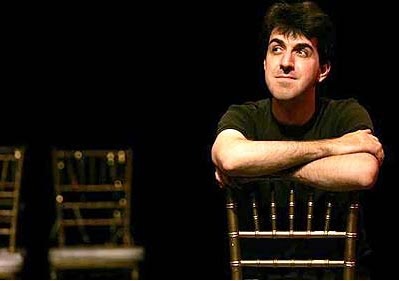
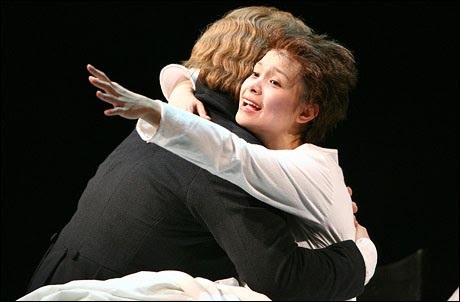
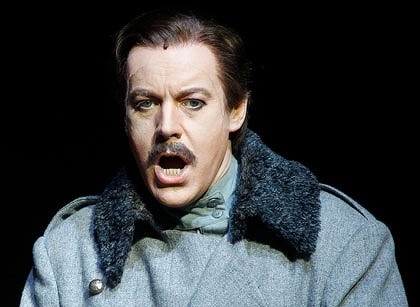
 RSS Feed
RSS Feed